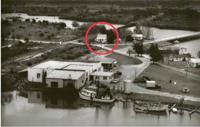Charlotte County commissioners agreed during a Sept. 16 workshop that the historic Placida Bunkhouse should be preserved, but how it will be restored, funded and possibly relocated remains undecided.
The bunkhouse, built in 1907, once housed workers of the Charlotte Harbor and Northern Railroad. The line played a critical role in the county’s early economy by transporting phosphate to Port Boca Grande for shipment worldwide.
Commissioners said the bunkhouse is an important reminder of that history, particularly for residents in West County. Commissioner Ken Doherty, who hails from New England, where there is an abundance of historic structures, noted that Charlotte County doesn’t have many.
The building was moved in 2007 from its original site near the Coral Creek Bridge to avoid demolition during the bridge’s realignment. It now sits at the trailhead of the Cape Haze Pioneer Trail near a Publix, where the county has maintained it for nearly two decades.

A historic photo shows the Placida Bunkhouse in its original location near the Coral Creek Bridge, circled in red.
Community Services Director Tommy Scott presented commissioners with several options, ranging in cost from $30,000 to more than $2 million. He said funding will need to include private contributions if the county moves forward with any plan.
Relocating the bunkhouse to its original site in Placida and renovating it could cost $1 million to $2 million, commissioners said. Assistant County Administrator Claire Jubb noted the site’s elevation requirements would add significant expense. The structure would have to be raised from its current 4 feet to 10 feet, with no option for a variance or exemption from the Federal Emergency Management Agency.
Commissioner Bill Truex, a builder, said the cost of fill alone would be considerable.
Some commissioners questioned whether the building should be moved back at all. “From a resiliency standpoint, I don’t know if I’m really interested in moving it,” Commissioner Chris Constance said. He argued the current site is safer from storm surge than Placida, where another hurricane could cause significant damage.
While relocation is uncertain, commissioners generally favored Scott’s third option: keeping the bunkhouse in its current location with modest improvements to increase public access and understanding of its history. That plan would add an Americans with Disabilities Act-compliant sidewalk around the building and interpretive panels describing its significance. The estimated cost is $30,000 to $45,000.
More ambitious plans include installing ramps and walkways for close-up access, but without entry to the interior, at a cost of $100,000 to $126,000. For an additional $25,000 to $35,000, interior improvements could be made, such as adding lighting and furnishing one room to reflect pioneer life. Visitors would be able to view the staged room through an exterior panel, with audio and motion-activated displays enhancing the experience.

Community Services Director Tommy Scott presents options for the future of the historic Placida Bunkhouse during the Charlotte County Commission workshop Sept. 16.
Scott said the estimates came from outside consultants. The total cost of relocation and elevation to meet FEMA requirements remains unknown.
Commissioners also discussed the possibility of private fundraising to help cover expenses. Truex said he would approach his Rotary Club about assisting with nonprofit fundraising, while Doherty offered to volunteer his engineering expertise to reduce costs.
“It is important for us to get a budget together and get private donations, as well,” Doherty said.
Scott was directed to return with more detailed proposals for commissioners to consider.
For now, all five commissioners agreed on one thing. The Placida Bunkhouse will remain part of Charlotte County’s history, even as its long-term future awaits further decisions and funding.








(0) comments
Welcome to the discussion.
Log In
Keep it Clean. Please avoid obscene, vulgar, lewd, racist or sexually-oriented language.
PLEASE TURN OFF YOUR CAPS LOCK.
Don't Threaten. Threats of harming another person will not be tolerated.
Be Truthful. Don't knowingly lie about anyone or anything.
Be Nice. No racism, sexism or any sort of -ism that is degrading to another person.
Be Proactive. Use the 'Report' link on each comment to let us know of abusive posts.
Share with Us. We'd love to hear eyewitness accounts, the history behind an article.